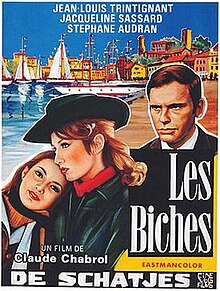Les Biches (1968 film)
| Les Biches | |
|---|---|

Film poster for Les Biches
|
|
| Directed by | Claude Chabrol |
| Produced by | André Genovès |
| Written by | Claude Chabrol Paul Gégauff |
| Starring |
Stéphane Audran Jacqueline Sassard Jean-Louis Trintignant Nane Germon Henri Attal Dominique Zardi |
| Music by | Pierre Jansen |
| Cinematography | Jean Rabier |
| Edited by | Jacques Gaillard |
|
Release date
|
|
|
Running time
|
95 minutes |
| Country | France Italy |
| Language | French |
| Box office | 627,679 admissions (France) |
Les Biches (The Does) is a 1968 French-Italian film starring Stéphane Audran, Jean-Louis Trintignant, and Jacqueline Sassard. It was directed by Claude Chabrol, and depicts a tortured lesbian relationship between the Audran and Sassard characters. Audran won the Silver Bear for Best Actress at the 18th Berlin International Film Festival. The film had a total of 627,164 admissions in France.
On the Pont des Arts in Paris, a rich and beautiful woman, Frédérique, picks up a penniless female street artist called "Why". Frederique seduces Why and takes her to her villa in Saint Tropez.
The villa is occupied by two gay friends of Freqderique, Robegue and Riasis. At a party, Why meets an architect, Paul Thomas. She leaves the party with him. They are followed by Robegue and Riasis, acting on Frederique's orders. They watch as Paul sleeps with Why.
Frederique visits Paul and sets out to seduce him. The two start having an affair. Frederique invites Paul to move into the villa, kicking out Robegue and Riasis.
One morning Why finds a note saying that Paul and Frédérique have gone to Paris. She follows them and goes to Frédérique's apartment. Discovering Frédérique alone, Why confesses to being jealous of both Frederique and Paul. Frederique tells Why she finds her love repulsive, and Why stabs her with a poisoned dagger.
Why calls Paul, pretending to be Frédérique, and invites him to the apartment. When he arrives Why is waiting for him dressed in Frédérique's clothes.
Chabrol later admitted he included the lesbian plot in order to help the film at the box office. It was the first film he made with Andre Genovese.
Chabrol talked about the story:
It is about the equilibrium of such a relationship, when someone else intervenes about the bargains that people make with each other. And about the rich, the advantage that they have over the poor, their richness. They can buy people, and the poor have to submit, until they revolt, and the only possible revolt is destruction. It is from a Marxist point of view but it is not political at all. I'm sure you cannot make a revolution with a camera. But you can show up all the people and things you dislike.
...
Wikipedia
